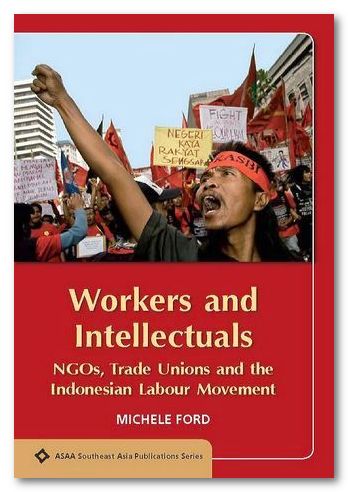Vedi R. Hadiz
‘The Indonesian case confirms that new understandings of the labour movement are necessary in order to properly document and theorise the contribution of labour NGOs and other non-traditional labour movement organisations to that movement’ (p.205). This is the major assertion of this information-packed book. The author’s underlying contention is that the majority of observers of Indonesian labour, this reviewer included, have underestimated the role of labour NGOs due to an ideological and/or intellectual inclination to emphasise trade unions as the main vehicle of labour struggles. Ford argues that the structural characteristics of Indonesia, like that of many post-colonial societies, necessitates a fundamental re-conceptualisation of what constitutes a labour movement in historical experiences as they differ so greatly from that of Europe and other advanced industrial societies. On the whole, she makes this argument very convincingly.
The book analyses Indonesia’s labour movement both during and after the New Order in scrupulous detail. While a lot of older ground is inevitably covered in the discussion of the heavily centralised and authoritarian Suharto-era, the account of the reconstitution of the labour movement in the reformasi period is undoubtedly the most comprehensive that is currently available. In fact, this reviewer would have welcomed a greater portion of the book being devoted to the newer issues and problems confronting the Indonesian labour movement. As Ford recognises – and demonstrates through her rich interview material – a major challenge for the labour movement has been how to remake itself. Many of the strategies adopted in coping with the authoritarian New Order became redundant in a democratised environment, although workers have remained marginalised. It is common for labour activists today to lament their inability to make the most of the opportunities offered by democratisation (p.182), and it is fair to say that they have been both puzzled and frustrated by their lack of success.
Ford is at her best when she delves into the intricate debates and painful soul-searching that have taken place within Indonesia’s labour movement over the years. Having evidently maintained contact with its activists over a fairly long time-span, she is also able to chart the trajectories of key individuals and organisations as Indonesia itself undergoes transformation.
The major point of debate that Ford is concerned with regards the position of actors she calls ‘intellectuals’, or non-workers who take part in labour struggles. She notes how both the ideas of the New Order and those of international labour organisations have tended to either demonise or belittle the role of middle-class activists in the labour movement who typically coalesce in various types of NGOs. In Suharto-era propaganda, they were considered ‘outside intellectuals’ (p. 3), and essentially troublemakers who were prone to taking workers on the erroneous path of dissent against the state. In the world-view that predominates within the mainstream international labour movement, middle-class intellectuals, at best, supplemented what necessarily had to be worker-led organisational vehicles. Given such a concern, several sections of the book duly examine ideas about the position of educated elites in Indonesian society (p.14) and debates about the role of intellectuals; ‘classical’ (those who remain socially distinct from workers that they help ‘enlighten’) and ‘organic’ (in the Gramscian sense of the term), which have taken place in Europe and elsewhere.
In the Indonesian case, among such activists have been radical students who attempt to imbue the labour movement with a stronger sense of class struggle, and who are inclined toward confrontation with state and capital in the form of strike action. Others, in more mainstream labour NGOs, are interested in improving organisational capacity incrementally, and carrying out educational, legal aid or welfare programmes. By the early 1990s, when the New Order had clearly aged but still seemed that it might last long, experiments took place to create trade unions as alternatives to the single state-sponsored vehicle that then existed. These were almost invariably led by middle-class activists, and created further tensions within the labour movement, as there was much discomfort with a strategy that implied direct courting of state repression. More conflict would occur, as Ford describes, with disagreements emerging about the direction of the labour movement following the fall of the New Order. For example, should NGOs now take a back seat? Should all-out formal unionisation be the way forward? Should the labour movement involve itself directly in electoral politics?
Ford makes a strong case for a recent history of the labour movement in Indonesia that takes the role of NGOs and its middle-class activists more seriously. Nevertheless, the way and extent to which these activists actually perform the function of intellectuals remains somewhat hazy. Though they undoubtedly help to articulate labour grievances and promote labour organising activity, they have been much less able and equipped to develop a coherent vision of the place of the labour movement in contemporary Indonesian society. Moreover, it is questionable that the continuing important role played by labour NGOs – in spite of the demise of authoritarianism, and the astonishing growth of formal trade union vehicles – is suggestive of their organic relationship to the labour movement. Instead, it could be just one of many indicators that the labour movement has only made limited qualitative progress, after more than a decade of democracy, in strengthening the bargaining position of workers in relation to both capital and the state.
Michele Ford. Workers and Intellectuals: NGOs, Trade Unions and the Indonesian Labour Movement. Singapore: NUS Press/Hawaii/KITLV and Asian Studies Association of Australia, 2009, 259 pp.
Vedi R. Hadiz (sochvr@nus.edu.sg) is an associate professor in the Department of Sociology, National University of Singapore
